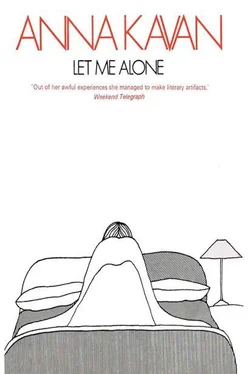The women acquiesced. Most obligingly they fell in with this masculine scheme in which they had their place simply as a recreation ground, a form of light relief to the male world, the world of work and sport and important affairs. The women did not seem to question the godlike supremacy of their men. They even seemed honoured when these super-beings bestowed their ephemeral attentions. Their lives simply revolved round the men.
The life led by the women was a narrow voyaging between home and club. In the morning, early, before the sun was strong, they would walk a little to one another’s houses, accompanied by a servant of some sort. The incongruity of those stiff, opinionated female figures, their pale, faded faces and clothes, so inappropriate, in the great burning flood of sunlight! They were rather shrivelled, too, from the perpetual sunlight. Or else flabby and overblown.
Mrs. Barry who lived close by, would come under her green sunshade to visit Anna in the morning. And then, flopping down in one of the cane chairs, Mrs. Barry would talk to her. Anna smiled and tried to seem interested and polite. But what a conversation. It was not really conversation at all. Just a long, rambling flow of trivialities — children and servants and goats and the bad food at the bazaar. Anna was bored beyond words. And yet in her extreme loneliness she was almost glad of the noise, the mere noise of human speech was something to be thankful for.
Mrs. Barry was kind. They were all quite kind-hearted: except perhaps Mrs. Grove, the commissioner’s wife. Anna would have liked to get on with them, if she could. But she could not. For they all seemed so unapproachable, like a family of matronly dolls, impossible to get to know them. They were all so drearily set, so elderly; and, with it all, so unconvincing. Anna felt as if she were at a mother’s meeting when she sat with them at the club. And they looked at her with suspicion. They seemed to suspect her of evil intentions. They envied her youth and her freshness and her smart clothes and the way the men looked at her, sideways, with a secret expression. They could not forgive her these things. And she was cool and composed in her manner towards them, indifferent apparently, she did not treat them with the deference that was due from a young newcomer. So they began to dislike her. It seemed as if Anna, the stranger, had a certain fascination for them, but a perverse attraction, an attraction of instinctive dislike. They suspected her of looking down on them. When she used a longer word than usual, their backs went up, they privately accused her of being pretentious and conceited and affected. That most dismal of all hostilities, the touchy resentment of the ordinary person for an intellectual superior, had them in its grip. To Anna it sometimes seemed that she must die.
And the emptiness! The emptiness of the long hours of heat, when the world outside was a burning dazzle of brightness, and there was nothing to do but sit indoors and wait for sunset and the nightly expedition to the club. The other women kept themselves busy with their children and housekeeping and sewing, an apotheosis of domestic monotony. How was Anna to pass the time?
The house was horrible. It was painful to her to live a single day in such a place. She detested the hideous cane furniture in the drawing-room, the ugly primitive bareness of her bedroom, the stale, sickly smell which pervaded the dining-room. It was all sheer horror. She thought of the careful luxury of Blue Hills, and wondered how human beings could condemn themselves to live in such a place as this. But she did nothing in the way of improvement. She did not know where to begin.
The house was quite large: and dilapidated. The wood was crumbling with some sort of rot, the white-washed walls were blotched and discoloured from the last rains. It all needed doing up. Probably it needed structural repairs as well. The balcony outside her room was beginning to sag dangerously. Who would do these things? Who would pay for them to be done? She did not know if there were workmen in Naunggyi capable of undertaking the job — even if she could find the money to pay them. She had no energy with which to contend with these difficulties. She was too stunned, too apathetic. In a trance of vague discomfort she endured it all. She sat in the broken cane arm-chair. And from outside came the cries of the parrots by day and of the frogs by night, mocking and unearthly in the solitude.
For a time Anna was completely overcome. She seemed submerged. Naunggyi had drowned her, deep, deep, in unfathomable seas of strangeness. It seemed as though she would never come up again. She was done for, drowned. And then something changed in her mind, she altered. It was not that she came to any decision; her vagueness, her bewilderment, her general behaviour remained much the same. But she looked at things from a different standpoint. Whereas before she had been submissive, stunned, indifferent, she now felt herself in violent opposition to everything. She still submitted, she made no effort, but behind her submission there was a new bitterness of resentment. She remained passive and dazed. And yet there was in her a fury of resentment all the time. Furiously her resentment piled up, against her daily life, against Matthew, against the house, against everything.
At times she could hardly bear it. It shook her like a madness, the violence of opposition that was in her. But it seemed that it could find no outlet. Not yet. It was all bottled up inside her, a seething frenzy of unspeakable indignation. But at the same time she was aware of a lightening somewhere. It was too slight, too remote to be called thought. But far off, at the very bottom of her consciousness, there was a stirring, a sensation that the worst was over. The night was black still, utterly, dismally profound; but it had passed the darkest, morning was on the way.
Inward stirrings notwithstanding, her existence continued irksome and monotonous to distraction. She still felt she would die, in the horrible, maddening blankness of it all. Certainly, the country was attractive, with a thrill of magic. But she could never really get near to it, she was shut out. So that even the beauty of the place only added to her sense of lonely futility.
The bungalow depressed her more and more.
‘The place is like a stable,’ she said to Matthew, with a tone of sudden exasperation in her voice. He looked at her in surprise. It was her first complaint.
Matthew’s attitude was rather peculiar. At Richmond, he had been full of apologies for the deficiencies of River House. But here, in Naunggyi, he accepted without demur every discomfort, every sordid detail, and expected Anna to do likewise. This was his world, he was in his true element, the dominant, complacent male. He had his work and his sport, he had Anna. He was a ruler of the people. What more could he want? He fairly pranced with complacency these days.
His satisfaction made him good-humoured. Since Anna was not satisfied with the house it must be embellished. They set out early one day to drive to the bazaar in Naunggyi. The early-morning landscape was wonderful, pale gold and blue and green, the marsh glimmered anew. Natives were going along the road to the village, women in their bright skirts, some of beautiful thick silk with the flowery, intricate patterns, blue, purple, scarlet, green, with baskets on their coiled hair: men with bare bluish tattooed thighs, treading softly in the thick dust: jungle people in single file, fantastic, gnome-like, trotting silently under great mushroom hats.
The bazaar was brilliant, there in the centre of the village, among the bamboo houses on their wooden piles. All the houses were perched up above the ground, as if they were on stilts. It gave the village a quaintly fantastical look, like a village in fairyland. Silks, cottons, slippers, hats, jewellery lay spread out on the low stands under the palm-leaf awnings: further on was the crowded food-market. From bullock-carts bales and bundles were arriving, people came up with every conceivable thing, baskets, coco-nuts, pottery, umbrellas, sweets, cosmetics, and loads of vegetables and fruit and flowers.
Читать дальше












